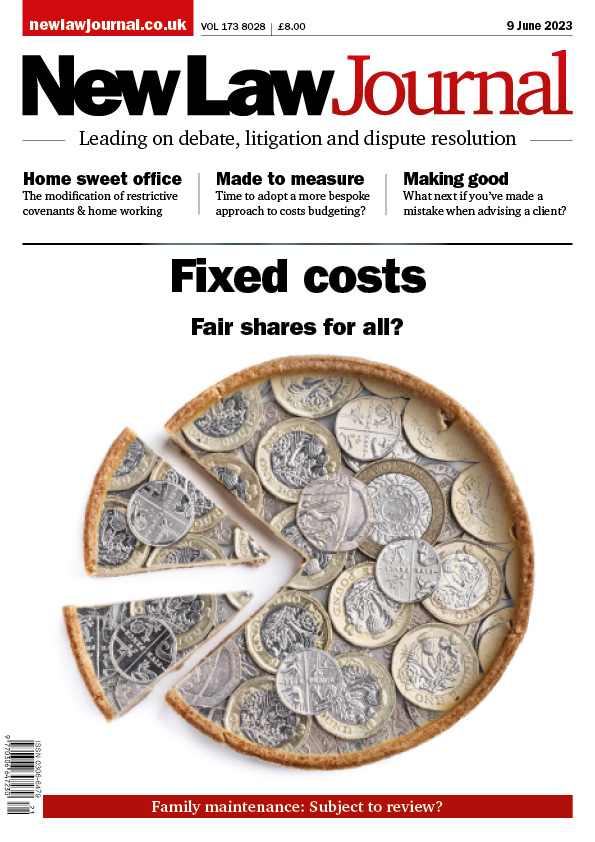THIS ISSUE

Home-working has created legal conundrums for property practitioners—what to do about covenants preventing business use? In this week’s NLJ, Michael Ranson and Taylor Briggs, barristers at Falcon Chambers, explore the recent case of Hodgson v Cook in which a home owner sought modification of a covenant prohibiting home-working.
When you make a mistake when advising a client, what should you do? In this week’s NLJ, John Gould, senior partner at Russell-Cooke, explains why ‘sorry’ may be the hardest word, but not saying it could cost you lots of money.
Costs budgeting, guideline hourly rates and the extension of fixed costs were among the topics covered in a recent batch of recommendations handed down by the Civil Justice Council (CJC). In this week’s NLJ, Julian Chamberlayne and Louise Morgan welcome the ‘various bespoke processes’ championed in the CJC’s final report, and set out their thinking on the reforms ahead.
The fixed costs rules are almost here. Published at the end of last month although not effective until 1 October, ‘palpable anxiety is already coursing through the legal profession,’ Professor Dominic Regan reports in this week’s NLJ.
Ring the bells & sound the drums: the fixed costs rules are almost here. Dominic Regan provides the lowdown on what to expect & how to prepare
Recent years have shown how quickly fortunes can change: Stephen Gerlis makes the case for regular reviews of maintenance payments in private family law
How can the family courts achieve hearings ‘within a reasonable time’? David Burrows sets out some practical ideas for speeding up cases
The rise of home working has created an uncertain landscape for property practitioners: Michael Ranson & Taylor Briggs report on ‘business use’ & the modification of restrictive covenants
Nothing is ever certain in litigation: David Walbank KC assesses the Court of Appeal’s reversal of a first-instance decision on state immunity
The Civil Justice Council has handed down a wide range of recommendations on costs budgeting, guidelines hourly rates & beyond: Julian Chamberlayne & Louise Morgan hail the arrival of a more bespoke approach
MOVERS & SHAKERS

NLJ Career Profile: Ken Fowlie, Stowe Family Law
Ken Fowlie, chairman of Stowe Family Law, reflects on more than 30 years in legal services after ‘falling into law’

Jackson Lees Group—Jannina Barker, Laura Beattie & Catherine McCrindle
Firm promotes senior associate and team leader as wills, trusts and probate team expands

Asserson—Michael Francos-Downs
Manchester real estate finance practice welcomes legal director
NEWS
Children can claim for ‘lost years’ damages in personal injury cases, the Supreme Court has held in a landmark judgment
The Supreme Court has drawn a firm line under branding creativity in regulated markets. In Dairy UK Ltd v Oatly AB, it ruled that Oatly’s ‘post-milk generation’ trade mark unlawfully deployed a protected dairy designation. In NLJ this week, Asima Rana of DWF explains that the court prioritised ‘regulatory clarity over creative branding choices’, holding that ‘designation’ extends beyond product names to marketing slogans
From cat fouling to Part 36 brinkmanship, the latest 'Civil way' round-up is a reminder that procedural skirmishes can have sharp teeth. NLJ columnist Stephen Gold ranges across recent decisions with his customary wit
Digital loot may feel like property, but civil law is not always convinced. In NLJ this week, Paul Schwartfeger of 36 Stone and Nadia Latti of CMS examine fraud involving platform-controlled digital assets, from ‘account takeover and asset stripping’ to ‘value laundering’
Lasting powers of attorney (LPAs) are not ‘set and forget’ documents. In this week's NLJ, Ann Stanyer of Wedlake Bell urges practitioners to review LPAs every five years and after major life changes







